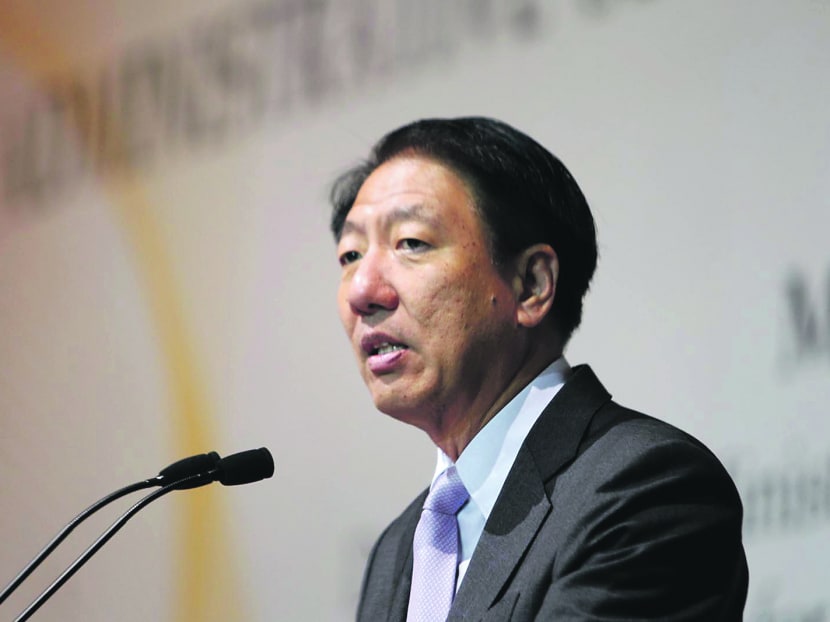Hijab issue: Govt must ‘balance community requirements’
SINGAPORE — Government leaders yesterday weighed in on the hijab issue, which made its way back into the national spotlight in recent weeks, with Deputy Prime Minister Teo Chee Hean reiterating that, while the Government understands “community perspectives”, it also “has the responsibility to balance all these different community requirements and keep in mind what we need, to maintain overall social harmony”.
SINGAPORE — Government leaders yesterday weighed in on the hijab issue, which made its way back into the national spotlight in recent weeks, with Deputy Prime Minister Teo Chee Hean reiterating that, while the Government understands “community perspectives”, it also “has the responsibility to balance all these different community requirements and keep in mind what we need, to maintain overall social harmony”.
Minister-in-charge of Muslim Affairs Yaacob Ibrahim, who met Prime Minister Lee Hsien Loong together with Malay Members of Parliament (MPs) from the People’s Action Party over the matter, called for “constructive dialogue” as the way forward. “This is the Singapore way and has served everyone well over the years,” he said on Facebook.
Separately, a closed-door discussion was held between Malay PAP MPs and Muslim leaders, including those from PERGAS (Singapore Islamic Scholars & Religious Teachers Association).
On the meeting with the Prime Minister, Dr Yaacob said Mr Lee “stressed that his aim was to create an environment where Muslims and other faiths can practise their religions freely and peacefully”. “But he also explained why we must manage and balance the diverse needs of our multi-racial and multi-religious society,” he said. “As I mentioned before, it will take time, but we will find practical solutions if we continue to engage with goodwill.”
In 2002, a spirited public debate ensued after four Primary 1 girls who wore headscarves to school faced suspension if they continued doing so.
The issue cropped up again during a forum on race in September, where a polytechnic lecturer had asked why nurses were barred from wearing the Muslim headscarf.
This was followed by an online petition championing the cause last month, which was removed after 12,405 signatures were collected. Some netizens also criticised former and current Muftis who publicly spoke about the issue, prompting Dr Yaacob to speak out last week on Facebook against the attacks.
Dr Yaacob also noted then that wearing a hijab at the workplace would be “very problematic”. While Muslim women police officers, for example, are not allowed to wear the hijab on duty, Dr Yaacob pointed out that, “when they are out of uniform, they are free to wear the hijab”.
Issuing a statement yesterday, Mr Teo noted that “every community, when it presses for its own concerns, must bear in mind how that affects other communities and how others might see it”. He added: “That is the reality of living in a multi-racial, multi-religious society that we all have to internalise.”
Pasir Ris-Punggol GRC MP Zainal Sapari told TODAY that the Government is concerned about setting a precedent. “We cannot underestimate ... that other religious groups might make similar demands if the Government were to give leeway to the requests of a particular community,” he said. As an example, he cited Jehovah’s Witnesses who do not believe in doing National Service, which is contrary to the Government’s position of compulsory conscription.
Nevertheless, the hijab issue is “being looked into every year”, he said.
On Monday, the Fellowship of Muslim Students Association (FMSA) called on the Government to form a committee to discuss the matter.
FMSA President Hairudin Abd Hamid said the association acknowledged and appreciated the latest comments by Mr Teo and Dr Yaacob.
“However, we feel, respectfully, the comments did not explain the reason (justifying) the Government’s view that a change of policy (would) affect overall social harmony, which is being implied,” he said.
“In our statement (on Monday), we explained that there is much evidence in other advanced societies to show that allowing Muslim girls to wear the tudung ... does not affect integration and social cohesiveness. And, in the case of nurses, who don the hijab in Western countries ... they are able to perform their (duties) professionally.”
Recognising that government leaders “will need time to deliberate on the matter”, he said the FMSA hoped that a discussion could be held in due course. He added: “The Muslim community deserves a more open and objective explanation and we appeal again for the Government to allow for a forum to discuss this matter directly and openly.”







